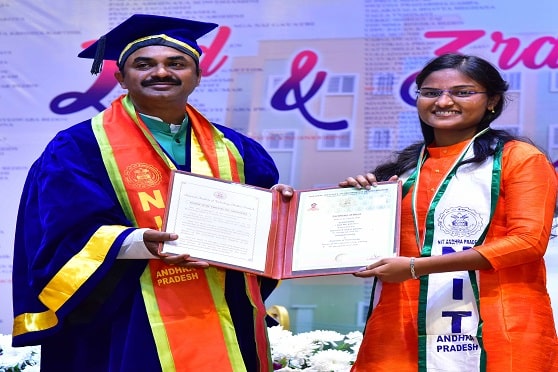NIT Andhra Pradesh: Focus on innovation in convocation address by DRDO chairman


The National Institute of Technology (NIT), Andhra Pradesh, hosted its second and third convocation offline on November 13.
A total of 381 candidates of the 2016-20 batch and 412 candidates of the 2017-21 batch were awarded degrees on the occasion.
Karthik Reddy, a student of the department of Mechanical Engineering, was the institute topper and gold medallist of the 2016-20 Batch. B. Anusha, a student of the department of Electronics and Communication Engineering, was the topper of the 2017-21 batch.
On graduation of the third batch (2021-22), NIT Andhra Pradesh will qualify to apply for rankings under the National Institutional Ranking Framework (NIRF), established by Union ministry of education. The Institute of National Importance is working towards getting its programmes accredited by national and international bodies such as National Board of Accreditation (NBA). The institute is also in process of initiating an MBA programme from the next academic year.
Delivering the convocation address, chief guest and Defence Research and Development Organisation (DRDO) chairman G. Satheesh Reddy said: “Innovation has become one of the important tools today. A product, unless it is innovative, is very difficult for the world to accept today. Academic Institutions like NITs are the engines of innovations... The seeds for innovations have to come right from academic institutions.
Reddy underlined the need to develop new technologies. “The core research for technology development happens in academic institutions. That is why we have started many courses in Defence Technology in academic institutes.
“Youngsters are coming up with a number of start-up ideas. There are many start-ups working in defence technology ideas, which we have never seen,” Reddy said, adding that the defence ministry was encouraging thew new trend.
DRDO has set up specific schemes such the Technology Development Fund and the Dare to Dream scheme for start-ups and young entrepreneurs.
Guest of honour Dasarath Ram Yadav, director, Defence Research and Development Laboratory (DRDL), spoke about government initiatives to foster innovation in young minds. He stressed the need to provide the right environment and encouragement to start-ups.
“As youths of this country, you are going to be the drivers of our economy and development. Many multinational companies are headed by Indians who have graduated from IITs, NITs, IIMs and other premier institutions in India. When we could excel in other countries, why can’t we create organisations like Apple, Microsoft, Facebook, Google at India?” asked Yadav.
NIT Andra Pradesh encourages the innovative ideas of students and faculty. Two such innovative contributions from its faculty members are the development of Wi-Fi controller for smart rainwater harvesting and a protocol to address security in electric vehicle charging, which drew huge appreciation from across the country
Speaking earlier, Ms. Mridula Ramesh, Chairperson, Board of Governors, NIT Andhra Pradesh, said,
“While the pandemic raged, the world of work has changed. Digitisation and e-commerce have taken off. The world is continuing to change. Only now, in the past few years, the change is accelerating. From now on, periodically in your life, there will be change when you will be asked to make a choice. Understanding yourself – this atma gnana – will help you make the choice that brings you atmanirbharta,” said Mridula Ramesh, chairperson, Board of Governors, NIT Andhra Pradesh.
NIT Andhra Pradesh director C.S.P. Rao present a report on the progress made by the institute. “It is heartening to note that in these two graduating batches, the placement percentage has reached 78.82% for the 2016-2020 batch and 84.80% for the 2017-2021 batch, respectively. NIT Andhra Pradesh has not allowed the pandemic to disturb its academic commitments. Our institute has quickly adapted to the changing education system and moved ahead with the academic activities without going to a hiatus,” he said.
Rao said 2020 was a milestone year for NIT Andhra Pradesh. “The first batch of MTech admitted in September 2020 reported to the campus physically by the end of December 2020. We have organised a virtual induction programme for 2020 batch, and the first-year students have adapted to the institute's system.”